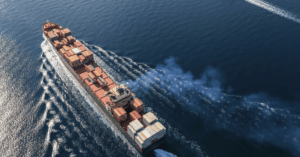
Israel Strikes Yemen’s Hodeidah Port After Warning Civilians To Evacuate
May 12, 2025
Indian Navy Receives ‘Most Silent Ship’ To Track Submarines In Shallow Seas
May 12, 2025

A coalition of non-profits and clean energy groups representing 82 stakeholders in the maritime and green hydrogen industries has urged the European Union (EU) to step up its climate efforts in the shipping sector.
The appeal comes after the International Maritime Organization (IMO) adopted new climate measures last month, which the group believes fall short of what’s needed to meet global climate targets.
In a letter sent to the European Commission and the EU Presidency, seven NGOs and industry alliances – including the SASHA Coalition, Zero Emissions Ship Technology Association (ZESTAs), Nature and Biodiversity Conservation Union (NABU), Carbon Market Watch, Green Hydrogen Organisation, ZERO – Associação Sistema Terrestre Sustentável, and Cittadini per l’aria onlus – criticised the IMO’s recently adopted regulations.
According to the group, the IMO’s measures, agreed during its Marine Environment Protection Committee (MEPC 83) meeting on April 11, 2025, were described as “historic” by some in the industry, but the alliance said they ultimately do not go far enough to align with the 1.5°C Paris climate goal or the IMO’s own 2023 climate targets.
The group stated that the current policies do not price nearly 90% of shipping emissions and fail to create strong financial penalties for polluters. They claim that it reduces the motivation to move away from fossil fuels and limits the funds available for supporting cleaner energy sources.
The result, according to the coalition, is that the shipping sector will likely miss its 2030 targets and achieve only a 10% reduction in emissions – far below the 30% goal outlined in the IMO’s 2023 Strategy.
They also raised concerns that the IMO agreement does not do enough to support green hydrogen and e-fuels like e-ammonia and e-methanol. These fuels, which have the lowest greenhouse gas emissions over their lifecycles, are considered the only realistic alternatives for achieving net-zero emissions in shipping.
However, the coalition said these fuels still face major challenges, such as high investment costs and limited production capacity.
While the IMO’s measures may offer small incentives for early adopters of zero and near-zero fuels, the group warned they might unintentionally benefit polluting alternatives such as liquefied natural gas (LNG) and biofuels, which could delay the shift to genuinely clean energy solutions.
To fill the policy gaps left by the IMO, the alliance urged the EU to move forward with a strong roadmap that would help the green shipping sector grow and boost Europe’s industrial competitiveness. The policy plan includes four key action points:
1. In 2025, introduce financial support for e-fuel producers through the upcoming Sustainable Transport Investment Plan (STIP).
2. In 2026, expand the EU Emissions Trading System (ETS) to cover more maritime emissions and use the funds to help develop e-fuels.
3. In 2027, strengthen the FuelEU Maritime regulations by setting legally binding targets for e-fuel adoption.
4. Push for stronger regulations at the IMO that promote e-fuel usage and penalise pollution, aligning with the EU’s Clean Industrial Deal goals.
Aurelia Leeuw, Director of EU Policy at the SASHA Coalition, expressed concern that without EU action, the shipping industry would not be able to adopt green hydrogen at scale. Leeuw noted there is still a chance for the EU to “nurture” rather than “neglect” its emerging clean shipping sector.
Lukas Leppert from NABU said the IMO’s limited steps represented a lost opportunity to cut emissions and lead the green maritime transition. However, he stressed that the EU still has a chance to correct this by following through on its reputation for strong climate leadership.
Madadh MacLaine, Secretary General of ZESTAs, also pointed out that the IMO’s decision could result in further investments into unsustainable fuel infrastructure, which might do more harm than good. She called on the EU to support science-based fuel lifecycle analysis and back stricter fuel targets.
References: bunkerspot, offshore energy
Source: Maritime Shipping News


